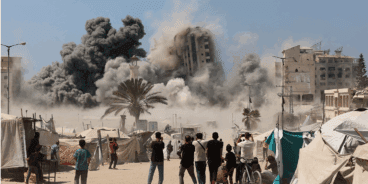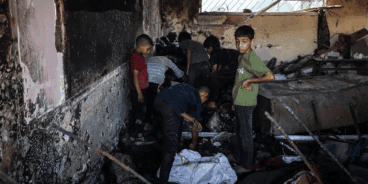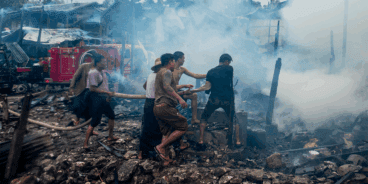
Atrocity Alert No. 93: Syria and Myanmar (Burma)
Atrocity Alert is a weekly publication by the Global Centre for the Responsibility to Protect highlighting situations where populations are at risk of, or are enduring, mass atrocity crimes.
Syrian government intensifies airstrikes on starving civilians in eastern Ghouta
Since Monday at least 296 people, including 54 children, have been killed by airstrikes, artillery and rocket fire across opposition-held eastern Ghouta. The Syrian government – with Russian and Iranian support – has intensified its bombardment of the enclave despite its formal designation as a “de-escalation zone” following the May 2017 Astana talks. Mortars fired by non-state armed groups operating in eastern Ghouta also killed four civilians in Damascus on Tuesday.
At least 393,000 people living in eastern Ghouta have been besieged by Syrian government forces since 2013, and only one humanitarian aid convoy has been permitted to reach a mere 7,200 people since December. As a result, approximately 12 percent of children under five years old are suffering from acute malnutrition – the highest rate recorded in Syria since the start of the civil war. Syrian government forces continue to use food as a weapon in eastern Ghouta, deliberately starving civilians and denying them access to vital humanitarian assistance.
According to the Union of Medical Care and Relief Organizations, at least 13 hospitals in eastern Ghouta have also been attacked since Monday, 19 February, including Al Marj Hospital, Saqba Hospital, Saqba Maternity Hospital, Al Hayat Hospital, Zamalka Hospital, Arbeen Hospital, Jobar Hospital, Al Anwar Hospital and Dar Al Shifaa Hospital. Deliberate attacks on medical facilities and the use of indiscriminate weapons in civilian populated areas demonstrate a complete disregard for International Humanitarian Law and International Human Rights Law, and amount to war crimes. They also directly contravene UN Security Council Resolutions 2286 and 2139.
As with the fall of Aleppo in December 2016, the besiegement and intense bombardment of eastern Ghouta appears to be a prelude to a final offensive to take back control of the area and punish its inhabitants. During nearly seven years of bloody civil war various foreign powers have militarily intervened in Syria, either directly or via armed proxies. No one, however, is coming to the aid of civilians in eastern Ghouta and it appears unlikely the UN Security Council will even agree to call for a cessation of hostilities.
On Tuesday UNICEF, the UN Children’s Fund, issued a rare blank statement, saying that “no words will do justice to the children killed, their mothers, their fathers and their loved ones” in Syria. As the world watches the horror in eastern Ghouta unfold, the broader international community should intensify efforts to hold all those responsible for alleged war crimes and crimes against humanity accountable, including through the UN’s International, Impartial and Independent Mechanism to assist in the investigation and prosecution of perpetrators of atrocities in Syria.
Myanmar (Burma) bulldozes mass grave of massacre victims
On Monday, 19 February, the Arakan Project – a human rights monitoring organization – reported that the government of Myanmar has bulldozed a mass grave containing the bodies of murdered Rohingya civilians. Their findings reveal a deliberate attempt to conceal evidence of atrocities committed by Myanmar’s security forces in northern Rakhine State. A government spokesman denied any cover-up and claimed that the local government was simply clearing the area to construct new villages for the potential resettlement of returning Rohingya refugees.
The bulldozed site was reportedly in Maung Nu, Buthidaung Township, where a massacre was perpetrated last August. Survivors of the massacre described the killing of local Rohingya civilians by the security forces, as well as widespread sexual violence. Satellite imagery obtained by Human Rights Watch confirmed the destruction of Maung Nu in the aftermath of the massacre. More than 350 Rohingya villages have been systematically attacked and burned down by the security forces since August 2017, causing more than 688,000 Rohingya to flee to Bangladesh.
With growing evidence that a genocide has been perpetrated against the Rohingya, the government of Myanmar continues to deny access to northern Rakhine State for independent investigators and media. The UN Security Council should demand immediate access for UN representatives to Rakhine State, including the Special Rapporteur on the situation of human rights in Myanmar and members of the Fact-Finding Mission mandated by the Human Rights Council. Given attempts to conceal evidence and the unwillingness of the Myanmar authorities to hold perpetrators accountable, the Security Council should refer the situation in Rakhine State to the International Criminal Court.
All UN member states should also take immediate bilateral action to uphold their responsibility to protect the Rohingya population, including imposing targeted sanctions against senior military officers responsible for atrocities in Myanmar, suspending all military training programs, and reviewing all aid and development programs in Rakhine State.


Atrocity Alert No. 450: Education Under Attack, Democratic Republic of the Congo and Syria
